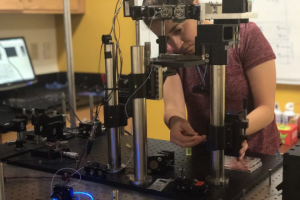 What is your name and where are you from?
What is your name and where are you from?
My name is Zahra Nafar and I was born in Iran, Tehran.
What degree are you pursuing?
I am pursuing a Ph.D. degree in Biomedical Engineering
Why did you decide to study biomedical engineering?
Biomedical engineering fulfills every aspect of my passion for science. I am an optical engineer who knows coding and sets up electrical and mechanical systems. I need to run chemical experiments and I have to know everything about biological and physiological systems related to my study. It is always new and never the same as yesterday. Also, knowing that I am contributing to human healthcare and patients’ quality of life keeps me motivated every day.
What’s it like being a woman in engineering? Do you feel that your gender gives you a different perspective and/or experience from your male colleagues?
I believe there are certain qualities in each gender that on average might separate them from each other. However, as we move forward in time it will get harder to distinguish genders by these known qualities. One thing that I have noticed comparing myself to colleagues, is the confidence of expressing our opinion. Although averagely is more in male compared to female, culture and personality also play a significant role between people of the same gender.
What is the most challenging part about being an engineer?
The most challenging and also exciting part of being an engineer is the fact that you either find a solution, or create a new one to solve a problem. Although I believe our social lives are affected by being an engineer— sitting in the office, working behind computers with all the serious engineers around you is quite different that working in the galleries of art departments. And I do believe women bring a special energy to the working place which was previously lacking in engineering departments.
Are you a part of any clubs or organizations at FIU? Carried any leadership roles?
I am a part of Biomedical Engineering Society (BMES) at FIU. I have served as the president of this student chapter for two years.
Do you have any female mentors or role models that you look up to?
Not really, but if I want to choose, it will be Donna Strickland. She is a Canadian Optical Physicist that won the Nobel Prize in physics in 2018.
Which part about your BME experience are you most proud of and/or excited for?
I am proud that I learned about all kinds of engineering in BME and I am excited that now, there is no job position that I am intimidated by. I know now that we are trained to learn all sort of new fields and integrate them to save human lives.
Do you have any advice for women in BME?
In my experience, women in BME have proved to be the best leaders in addition to their knowledge. And that quality can make women in BME even more significant.
